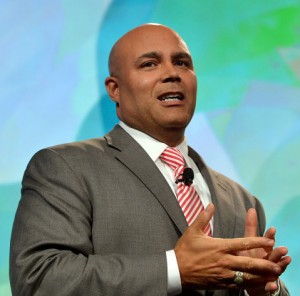It looks like Tom Wheeler, the chairman of the Federal Communications Commission (FCC), is following through with his promise to rewrite the Open Internet rules that were vacated by DC Circuit Court of Appeals in January. Though many are skeptical that the proposed rules will be enough to protect consumers. In a Notice of Proposed Rule-Making (NPRM) the FCC will be asking for public comment on new rules that would allow internet service providers to charge streaming content providers, such as Netflix and Amazon, more for preferential treatment as long as the same deals are available to others on “commercially reasonable” terms. The FCC would use its authority to review these arrangements to ensure that they don’t harm consumers and competition.
The rules are not expected to be made public before a May 15 FCC meeting to discuss them. Following a public comment period, a commission vote on the rules is likely to occur sometime in the summer.
Wheeler says the FCC will not allow an internet ‘slow lane’. While the proposed rules would allow for paid priority access, he said the focus on the so-called “fast lane” ignored that non-priority traffic would have to be “sufficiently robust to enable consumers to access the content, services and applications they demand.”

In his official FCC blog the Chairman lays out some good arguments for the course that he is pursuing. He reminds us that the court did not throw out the rule requiring providers to manage their networks in a transparent manner, making oversight possible (nice of them). In theVerizon v. FCC decision the D.C. Circuit laid out a blueprint for how the FCC could use Section 706 of the Telecommunications Act of 1996 to create Open Internet rules that would stick, and this is the course he pursuing (see my post: Net Neutrality – To Be or Not to Be).
Tom Wheeler seems to be acting with good faith to find a way forward that the majority of people will find acceptable. He seems genuinely determined that no ISP will be allowed to block or slow down any legal content but the goal is to also have rules in place that will encourage broadband providers to continually upgrade service to all. As demand for bandwidth increases network congestion becomes a bigger and bigger problem. Managing network congestion is very complicated and expensive. He believes the best way to do this is by exercising the FCC’s authority, upheld by the court, to enforce the “commercially reasonable” standard that is in the communications act of 1996. Here is what he says are not “commercially reasonable” on the Internet:

- Something that harms consumers is not commercially reasonable. For instance, degrading service in order to create a new “fast lane” would be shut down.
- Something that harms competition is not commercially reasonable. For instance, degrading overall service so as to force consumers and content companies to a higher priced tier would be shut down.
- Providing exclusive, prioritized service to an affiliate is not commercially reasonable. For instance, a broadband provider that also owns a sports network should not be able to give a commercial advantage to that network over another competitive sports network wishing to reach viewers over the Internet.
- Something that curbs the free exercise of speech and civic engagement is not commercially reasonable. For instance, if the creators of new Internet content or services had to seek permission from ISPs or pay special fees to be seen online such action should be shut down.
This course of action is the easy way out for Mr. Wheeler as it stops short of reclassifying broadband service providers as telecommunications providers subjecting them to regulation as public utilities. He has this power under Title II of the Communications Act but he has only threatened to use it if providers abuse their power. He knows there would be massive backlash from Republicans and Business Groups if he tried. Michael Powell, former FCC Chairman under George W. Bush, now working as head of the National Cable and Telecommunications Association (NCTA) has come out strongly against it. It was he who, back in 2002, classified cable broadband as an “information service” rather than a telecommunication service that got us into this mess.

Powell’s simplistic argument that all one has to do is look at the state of disrepair of public infrastructures – bridges, roads, electric grid etc.- controlled by public utilities, to see why regulations are bad is specious; sidestepping a major cause which is Wall Street apathy driven by an intense and selfish focus on maximizing corporate profits for a few and to hell with the public good. Are we to just pretend that the financial collapse of 2008 was an accident and the massive greed of the banks and corporations had nothing to do with it? Six years later while communities everywhere are still struggling to pick up the pieces corporate profits have never been higher – check it out, it’s from the Bureau of Economic Analysis.
Wheeler, himself a former head of the NCTA from 1976 – 1984, should know better than anyone that it is inevitable that abuses will take place. “Commercially reasonable” is a very subjective term that can mean whatever you want it to. Does he really believe that this will protect consumers from the ill effects of the industry’s chronic binge profiteering problem? Rather than just threaten to, he needs to take a deep breath and get it over with – force them to go cold turkey – declare broadband internet, once and for all, a public utility. He can do this by simply calling it by its true name – a telecommunications service – which everyone already knows it is. Truth can set you free. He needs to act on his principles and stand up to the Plutocrats. Doing so he would win the gratitude of decent, hardworking people everywhere. Unfortunately, it doesn’t look like he’s up to it. We’ll see. I’m afraid a public intervention is going to be needed.
He would do well to read the 2011 article “Of the 1%, by the 1%, for the 1%” in it the Nobel-Prize winning economist Joseph Stiglitz wrote:
Of all the costs imposed on our society by the top 1 percent, perhaps the greatest is this: the erosion of our sense of identity, in which fair play, equality of opportunity, and a sense of community are so important. America has long prided itself on being a fair society, where everyone has an equal chance of getting ahead, but the statistics suggest otherwise. …There is ample evidence that something has blocked the vaunted “trickling down” from the top 1 percent to everyone else. The cards are stacked against them. [There] is this sense of an unjust system without opportunity.
Alexis de Tocqueville once described what he saw as a chief part of the peculiar genius of American society—something he called “self-interest properly understood.” The last two words were the key. Everyone possesses self-interest in a narrow sense: I want what’s good for me right now! Self-interest “properly understood” is different. It means appreciating that paying attention to everyone else’s self-interest—in other words, the common welfare—is in fact a precondition for one’s own ultimate well-being. Throughout history, this is something that the top 1 percent eventually do learn. Too late.
 Email This Post
Email This Post